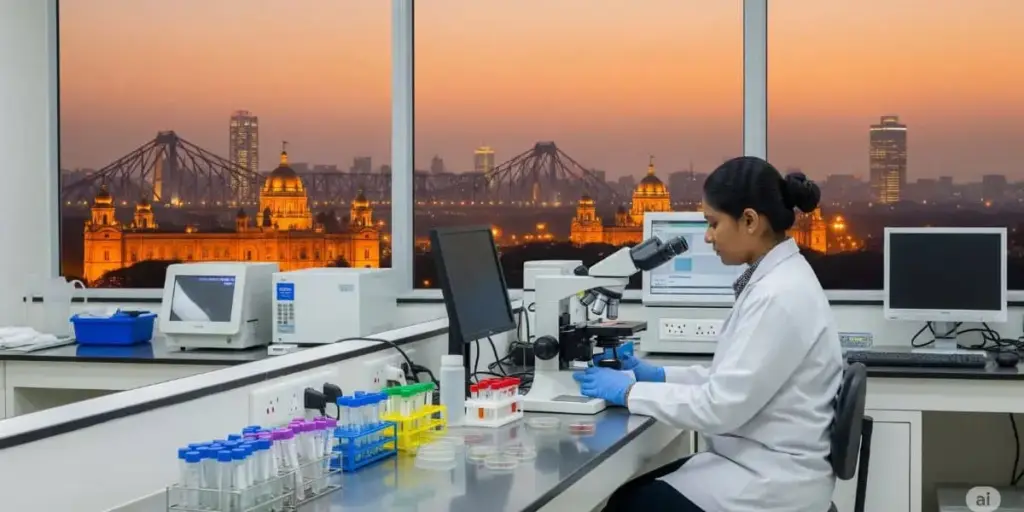Table of Contents
1. Introduction: Why the Health Care Lab Matters
A health care lab is more than just a testing site – it’s the powerhouse behind accurate diagnosis, timely treatment decisions, and preventive care strategies that save lives. Whether it’s routine blood work, cutting-edge genetic analysis, or microbiological surveillance, the health care lab stands at the core of modern medicine. Understanding its role, processes, technologies, and best practices is essential for healthcare professionals, policymakers, and patients alike.

2. What Is a Health Care Lab?
2.1 Definition & Scope
A health care lab is a specialized facility where clinical specimens – such as blood, urine, tissue, or other body fluids – are analyzed to provide data-driven insights for diagnosis, treatment, and monitoring. It encompasses various disciplines:
- Clinical Pathology
- Microbiology
- Histopathology / Cytology
- Molecular Diagnostics
- Toxicology & Wellness Screening
2.2 Historical Evolution and Importance
From rudimentary microscope slides to automated genomic sequencers, the evolution of the health care lab, like Feliz Health, tracks closely with advances in medicine. Early labs focused on basic microscopy and culture methods. Today’s labs embrace automation, digital tools, and AI to deliver faster and more accurate results.
The importance of a health care lab cannot be overstated: accurate lab results underpin effective treatment, improve patient outcomes, and ensure cost-efficiency in healthcare systems. Strong evidence demonstrates that lab diagnostics reduce hospital stays and prevent unnecessary interventions. For example, the World Health Organization underscores the pivotal role of laboratory services in disease surveillance and outbreak control. WHO: Laboratory services in global health (credible and authoritative). Another authoritative source, the U.S. Centers for Disease Control and Prevention, highlights lab diagnostics as essential in preventing infectious diseases. CDC: Labs and Disease Detection
3. Types of Health Care Labs & Their Core Services
3.1 Clinical Pathology Labs
Primarily focused on analytes in blood, urine, and other fluids:
- Complete Blood Count (CBC)
- Liver & Kidney Function Tests
- Blood Glucose & Lipid Panels
These tests are essential in detecting anemia, infections, organ dysfunction, and metabolic disorders.
3.2 Microbiology Labs
Tasked with detecting pathogens like bacteria, viruses, fungi, and parasites. Services include:
- Culture & Sensitivity Testing
- PCR-based Pathogen Identification
- Antimicrobial Resistance Testing
These functions are critical for infection control and public health decision-making. The CDC emphasizes the role of microbiological labs in tracking antimicrobial resistance globally. CDC: Antibiotic Resistance
3.3 Histopathology & Cytology Labs
- Biopsy Analysis
- Cancer Detection via Microscopy
- Cytological Evaluation (e.g., Pap Smears)
Accurate tissue analysis is vital for early detection of malignancies and guiding treatment options.
3.4 Molecular Diagnostics Labs
- Genetic Mutation Analysis
- Next-Generation Sequencing (NGS)
- Rapid PCR Tests for Pathogen Detection (e.g., COVID-19)
These represent the frontier of diagnostic precision, enabling personalized medicine.
3.5 Toxicology, Wellness & Preventive Labs
- Drug Testing (therapeutic drugs, workplace screening)
- Wellness Packages – blood sugar, cholesterol, thyroid, vitamin levels
- Preventive Health Panels – cardiac risk, metabolic screening
4. Key Services Provided by Health Care Labs
4.1 Routine Testing & Wellness Panels
Labs offer packages combining:
- CBC
- Blood Chemistry
- Thyroid Function
- Vitamin D/Hormone Profiles
These services help detect silent conditions before they escalate.
4.2 Infectious Disease Detection
From COVID-19 to HIV, tuberculosis, and beyond, the health care lab plays a frontline role in diagnosing infections and guiding public health responses. WHO: COVID-19 Laboratory testing
4.3 Cancer Biomarkers & Genetic Screenings
- PSA, CA-125, CEA and other tumor markers
- BRCA gene testing and hereditary disease screening
Delivered via health care lab molecular and pathology services.
4.4 Drug Safety & Toxicology
- Workplace Drug Testing
- Therapeutic Drug Monitoring
- Poison/toxin detection
Essential in ensuring proper dosing and identifying exposure risks.
5. The Role of Health Care Labs in Modern Medicine
5.1 Early Detection & Screening
Routine lab tests detect disorders like diabetes, thyroid dysfunction, liver or kidney impairment BEFORE symptoms appear – enabling timely intervention.
5.2 Treatment Monitoring and Adjustment
Regular lab monitoring helps:
- Track medication efficacy (e.g., anticoagulant levels)
- Monitor chemotherapy response
- Prevent adverse drug interactions
5.3 Supporting Evidence-Based Medicine
Precise lab data inform tailored treatment protocols. Research consistently shows that lab-guided interventions reduce hospital readmissions and improve outcomes.
5.4 Public Health and Outbreak Management
Health authorities rely on aggregated lab results to monitor disease trends, detect hotspots, and launch targeted interventions.
6. Technologies Powering the Modern Health Care Lab
6.1 Automation & AI Integration
- Automated Analyzers for high-throughput testing
- AI-assisted Interpretation of complex results (e.g., cytology slides)
- Robotic Sample Handling to improve accuracy and efficiency
6.2 Point-of-Care Testing Devices
Accessible, rapid testing tools deployed in:
- Ambulances
- Remote clinics
- Home-care setups
Enabling the health care lab to extend its reach beyond physical facilities.
6.3 Digital Pathology & Remote Diagnostics
High-resolution slide scanning and telepathology platforms allow pathologists to analyze samples remotely – a powerful modernization trend post-pandemic.
6.4 Next-Generation Sequencing (NGS) & Molecular Tools
Comprehensive genetic profiling, mutation detection, and microbiome analysis are now routine in advanced health care labs.
7. Choosing the Right Health Care Lab
7.1 Accreditation & Quality Standards
Select labs with:
- NABL (India)
- CAP (US)
- ISO 15189 certifications
This ensures validated methodologies, quality control, and reliable results.
7.2 Service Breadth & Specialization
Ensure the health care lab offers the specific panel or advanced testing you require.
7.3 Turnaround Time & Customer Experience
Fast results and convenient services (e.g., home pickup, digital reports) significantly enhance patient satisfaction.
7.4 Skilled Personnel & Infrastructure
Trained pathologists, microbiologists, and technicians using modern analyzers and strict lab protocols ensure diagnostic accuracy.
7.5 Technological Capabilities
Labs with digital workflows, AI tools, and molecular platforms deliver cutting-edge diagnostics.
8. Innovations in Home Sample Collection & Tele-Lab Services
8.1 Home Collection Services
Many health care labs now offer sample pickup from home – especially valuable for elderly, mobility-challenged, or remote patients. Trained phlebotomists collect specimens with proper handling and chain-of-custody protocols.
8.2 Tele-medicine & Lab Integration
Virtual consultation platforms increasingly integrate with lab services. Patients can:
- Book tests
- Share results digitally
- Receive prescriptions – all without visiting clinics.
This integration enhances efficiency, accessibility, and patient compliance.
9. Ensuring Quality & Accuracy in the Health Care Lab
9.1 Calibration & Internal Quality Control
Routine instrument calibration, reagent validation, and control runs are essential.
9.2 External Proficiency Testing
Labs participate in external QA programs to benchmark accuracy and reliability.
9.3 Standard Operating Procedures (SOPs) & Training
Documented SOPs and regular staff training minimize human error and variability.
9.4 Data Security & Record Management
Electronic Health Record (EHR) integration with secure systems ensures patient confidentiality and traceability.
10. Future Trends of Health Care Labs
10.1 Precision Medicine & Personalized Diagnostics
Laboratories will deliver tailored diagnostic panels based on a patient’s genetic profile, lifestyle, and risk factors.
10.2 AI-Driven Diagnostics
Machine learning models will interpret complex patterns – e.g., cytology, radiology, multi-omic data – faster than humanly possible.
10.3 Wearable & Continuous Monitoring
Integration of lab-level sensors into wearable tech may provide real-time metabolic data, glucose, or cardiac markers processed by centralized labs.
10.4 Decentralized & Consumer-Accessible Testing
At-home genetic kits and rapid point-of-care tools will bring health care lab capabilities to consumers directly, while still maintaining lab oversight and quality control.
Conclusion
In modern healthcare, the health care lab is an indispensable powerhouse. It delivers accurate diagnostics, supports informed medical decisions, enables early intervention, and integrates seamlessly with emerging technologies – from AI to home testing kits. Whether you’re a clinician, healthcare admin, or patient, understanding how to choose and effectively utilize a health care lab empowers superior outcomes.
FAQs
What makes a health care lab trustworthy?
Accreditation (e.g., NABL, CAP, ISO), quality control protocols, skilled staff, and modern equipment are keystones of lab trustworthiness.
How frequently should one visit a health care lab for check-ups?
For healthy adults, annual screening is typical. Those with chronic conditions may require quarterly or monthly testing as advised by a physician.
Are home sample collections as reliable as traditional methods?
Yes – provided the health care lab ensures proper training, sample handling, cold chain management, and timely transport, results remain reliable.
Can health care labs detect diseases before symptoms appear?
Absolutely. Routine wellness panels, cancer markers, and genetic screenings can reveal early-stage or pre-symptomatic conditions.
How has technology improved lab testing accuracy?
Automation, AI, digital pathology, and molecular tools reduce human error, speed up analysis, and improve detection precision.
What role do labs play in public health?
They track disease trends, detect outbreaks, monitor antimicrobial resistance, and guide public health responses.
Is telemedicine making lab services more accessible?
Yes. Telehealth platforms integrated with lab ordering and digital result delivery make diagnostics more convenient.
What’s next for health care lab innovation?
Expect AI diagnostics, personalized panels based on genetic data, continuous monitoring via wearables, and decentralized testing availability.
How much does a lab test cost on average?
Costs vary widely depending on location, test complexity, and lab credentials. Wellness packages start modestly; specialized molecular tests may cost more substantially.
What should patients look for when choosing a health care lab?
Accreditation, test availability, turnaround time, home service options, digital reporting, and staff expertise are key factors.




